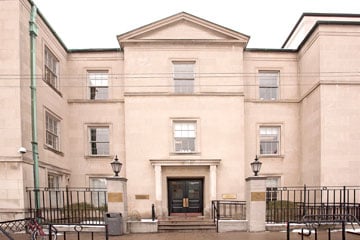
A Law Society of Ontario tribunal has found a real estate lawyer committed professional misconduct by misappropriating more than $1 million.

A Law Society of Ontario tribunal has found a real estate lawyer committed professional misconduct by misappropriating more than $1 million.
In Law Society of Upper Canada v. Piersanti, the tribunal relied on court decisions that determined lawyer Christian Piersanti had misappropriated the funds from a paving company with which he was involved.
The law society leaned on a trial decision and an appellate ruling that found Piersanti had committed fraud against the plaintiffs. In that matter, Alfano v. Piersanti, the courts found that Piersanti had acted on behalf of four brothers when they incorporated a paving company — Osler Paving Company — in 1993.
The Alfanos made Piersanti president of the company and gave him a 10-per-cent ownership interest.
He then acted for them to establish four family trusts, each with a 22.5-per-cent interest in the company, according to court decisions.
When one of the brothers withdrew from the company in 1997, the three remaining trusts each held 29 per cent and Piersanti held the remaining 13 per cent of shares.
In 2002, Piersanti claimed he owned the company after the relationship between the lawyer and the plaintiffs started to sour. He then listed Osler’s property for sale and assigned the company to bankruptcy, according to the court decisions.
Litigation ensued and after a trial, a judge awarded $250,000 in punitive damages to the Alfanos for “compensation for the fraud perpetrated on them” by Piersanti.
The judge determined Piersanti had fabricated a fraudulent shareholders’ agreement, improperly assigned the company into bankruptcy and had listed the property without informing the Alfanos. The judge also found that Piersanti had misappropriated more than $1 million from the company.
Piersanti disputed these findings in an appeal, but the Court of Appeal upheld them, determining that the lawyer had taken advantage of his position as the Alfanos’ lawyer.
The lawyer had argued that there was insufficient evidence to find liability against him for damages arising from the company’s bankruptcy, but the Court of Appeal disagreed.
“In my view, there was a strong case that Mr. Piersanti assigned Osler into bankruptcy as part of a fraudulent scheme to deprive the Alfano trusts of their interests in Osler,” wrote then-associate chief justice of Ontario, Dennis O’Connor.
The Court of Appeal also upheld the $250,000 in punitive damages.
Piersanti then sought leave to appeal the decision to the Supreme Court of Canada, but his application was dismissed.
The law society brought what’s called a CUPE Motion under the tribunal’s rules, which would allow the regulator to depend on the courts’ findings of fact rather than re-litigating the issues.
The tribunal granted the order and Piersanti unsuccessfully tried to appeal it to the Appeal Division of the Law Society Tribunal and the Divisional Court.
He then filed a motion to vary or set aside the Divisional Court’s decision to quash his appeal and requested an adjournment of the law society’s conduct hearing until that motion was heard. The tribunal, however, declined to provide an adjournment.
Christopher Wirth, partner with Keel Cottrelle LLP, who was not involved in the matter, says the decision confirms that findings of fact in other proceedings in which a party is involved can be used as prima facie evidence of the conduct in question.
“What it confirms is that when you are a party to a proceeding and findings of fact are made against you, your professional regulator is entitled to rely on those findings of fact,” he says.
“It will only be in exceptional circumstances that it will permit you to attempt to relitigate those findings.”
He says that if a lawyer is not a party in the proceeding but serves as counsel, then those findings may not be used against them as easily, or they may be given more latitude to introduce additional evidence.
He adds that the decision highlights that in administrative proceedings a party cannot appeal interlocutory orders until the completion of the proceeding, when it would form one of the many issues on the appeal from the final decision.
It’s only in extraordinary circumstances that an appeal of an interlocutory issue would be allowed to go ahead before the completion of the proceedings, Wirth says.
The tribunal determined that based on the facts established by the court decisions, Piersanti had committed professional misconduct.
“. . . [I]ntegrity is the fundamental hallmark of professional legal conduct,” wrote Frederika Rotter, a member of the tribunal panel.
“The lawyer’s significant misappropriation of funds, his attempted sale of the Osler building, the improper assignment of Osler into bankruptcy, and the lawyer’s creation of a fraudulent shareholders’ agreement — each of these acts constitutes conduct unbecoming that would tend to bring discredit on the legal profession. These acts involve dishonesty and are conduct that undermines the administration of justice.”
This summer, a judge refused to throw out a negligence claim a non-client brought against Piersanti concerning a mortgage transaction that turned out to be fraudulent.
The plaintiff in that case, Chegancas v. Godo, was a lender on a transaction and alleged that Piersanti, who had been retained by the borrower to provide independent legal advice, was negligent.
Piersanti brought a summary judgment motion to ask the judge to throw out the claim arguing lawyers do not owe a duty of care to non-clients.
The judge dismissed the motion, finding that it was arguable that there was “sufficient proximity” in the relationship between Piersanti and the plaintiff that could give rise to a potential duty of care.
Ross Morrison, the lawyer who represented Piersanti in the discipline matter, did not respond to requests for comment.